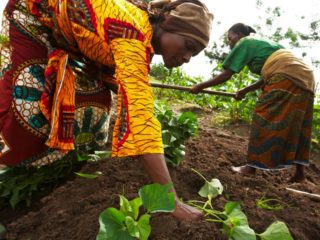Unleashing the power of urban agriculture in food security
The focus of the Federal Government
today is clearly on the agriculture sector based on the belief that the sector is
capable of getting the country out of its current economic doldrums. Although this
approach has significant merits, the pang of hunger biting millions of Nigerians,
especially people living in urban areas, needs urgent attention before it gets
out of hand.
Recently, the Food and
Agricultural Organisation (FAO), an agency of the United Nations, had to appeal
to the rest of the world to come to the aid people in the North-East of the
country to prevent them from dying as a result of hunger. Even if this was an
extreme scenario that arose as a result of devastation wrought on the region by
the dreaded Boko Haram insurgents, the situation in the rest of the country is
just marginally better as millions of Nigerians can no longer afford to feed
themselves.
But as Nigeria’s population
continues to grow and feeding the population remains a huge challenge for the government
to tackle, more attention needs to be given to unexplored alternatives like
urban agriculture that can help to feed the people and earn some foreign
exchange for the government if well developed. In the contemporary world, farming
is no longer seen as an activity functional to rural development alone. It is
now considered as an activity that is also beneficial for urban development.
Ironically, the way urban
agriculture is practiced in urban areas in Nigeria has always led to conflict
situations instead of avenues for growth. Urban agriculture in Nigeria is still
at the subsistence level and has failed to evolve to the level seen in other
parts of the world like India, Morocco, Netherlands or the US. The notion of
urban farming in Nigeria is still limited to growing food within city limits.
Internationally, the definition of urban farming also includes peri-urban areas
or ‘the entire area of land in which a city’s influence comes to bear daily and
directly on its population,’ according to UNDP.
Properly understood and managed,
urban agriculture should never give rise to conflict as witnessed in the case
of a Lagos couple who beat their neighbour to death over a chicken roost
recently. The couple, Segun and Sola Irein, who owned the roost, allegedly beat
Idowu Solaja to death in February when he complained to the couple that he was
being disturbed by the chickens. It was also reported that Segun who was initially
rearing pigs was forced to abandon the business after a series of complaints by
the deceased.
Mr. Tao Adeleke, an agricultural
expert, contends that the couple committed a needless crime because the kind of
farming they engaged in is not suited for urban areas. “Urban agriculture,” he
says, “is the practice of cultivating, processing, and distributing food in or
around an urban area. It can also involve animal husbandry, aquaculture, agro-forestry,
and horticulture in peri-urban areas.” Adeleke
believes that governments at all levels in Nigeria must begin to consciously
put in place structures and legislation for the practice of urban agriculture in
order to bring new life to urban areas and provide a driving force for
community development.
 |
| Audu Ogbeh, Agric Minister |
“The government must mobilize the
urban poor to engage in urban agriculture not just to solve the problem of
hunger but to also get the unemployed busy in productive ventures. Lower and
mid-level government officials, school teachers and unemployed people should
also be encouraged to get involved in agriculture. Urban agriculture may take
place in locations on land away from the residence or on public land such as parks,
conservation areas, along roads, streams and railways and semi-public land such
as schoolyards, grounds of schools and hospitals.”
According to the FAO, “the recent
world food price crisis has rendered the importance of understanding and
confronting the causes of food insecurity of the urban poor even more apparent.
Poor urban dwellers, being largely net food buyers and depending mostly on
markets for their food supplies, are particularly vulnerable to adverse food
price shocks, and are consistently the group in society that suffers most from
higher food prices. Urban agriculture is one of the solutions that are
perceived globally to meet the demand of food of urban population.”





How do I engage in urban agriculture
ReplyDelete